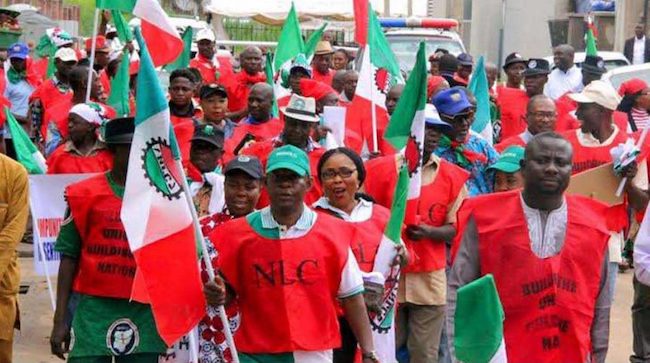News
NLC warns Nigerian govt of mass protest over naira scarcity

The Nigeria Labour Congress (NLC) has decried the latest naira scarcity in many parts of the country.
Reports emerged early this month about the latest naira scarcity nine months after the same problem occasioned by the redesign of the currency notes by the Central Bank of Nigeria (CBN) gripped the country.
In a statement issued on Wednesday by its President, Joe Ajaero, the NLC described the prevailing scarcity of the naira as unacceptable.
The union warned the Federal Government and CBN against testing the patience of long-suffering Nigerians.
It warned that a mass public protest was imminent if nothing was done to address the naira shortage.
The statement read: “The Nigeria Labour Congress (NLC) is deeply concerned about the recent cash crunch that has gripped the Nigerian economy, particularly as the nation approaches the festive season.
“This economic challenge has far-reaching implications for the citizens of our great nation, and urgent steps must be taken to address this issue to prevent further hardships for the already suffering Nigerian populace.
“Fresh in the minds of every Nigerian is the excruciating conditions that we were all subjugated to due to the last cash crunch earlier this year that was orchestrated by the ill-conceived and ill-implemented currency redesign policy of the immediate past government. The sorrow that botched exercise foisted on us is not what Nigerians wish to witness again in one year.
“This time, there is no discernible reason by the Central Bank of Nigeria (CBN) or any explanation from the government on why Nigerians should be subjected to this level of suffering once again in 2023.
“Though we have heard reasons like the increase in fake notes in circulation and the hoarding of the Naira, these reasons are clearly unacceptable as we cannot see anything that will make any Nigerian hoard the Naira. In any case, it is not the ordinary Nigerian that hoards money in their houses.
“If the CBN says that those with ill-gotten wealth are stashing cash in their houses to avoid detection, it becomes a heavy indictment on the government’s anti-corruption agenda. This is because what the CBN is saying is that since the assumption of office of this government, the level of graft has increased resulting in the creation of hideouts for the slush funds.
“The question then is; should the ordinary citizens be made to suffer the apparent incompetence of government in prosecuting the anti-corruption war or is it that there is no anti-corruption war going on?
“Nigerians are spending more time in the banks trying to source for cash not for monies that are not in their accounts but for their own money. This undermines the public’s confidence in the banks and may discourage the citizenry from participating actively in Banking.
“It is shameful that Nigerians would have to spend a lot of money to gain access to their hard-earned income. We are creating another avenue for economic rentiers such as the POS operators and their collaborators in the Banks to fleece Nigerians.
“Subjecting us again to spend our meagre salaries buying our money automatically devalues our income. PoS operators currently charge around N400 to access N10,000. This is about a 4% reduction in the value of the income of poor Nigerians who hardly make use of electronic platforms to perform their transactions.
“For citizens who are already impoverished by the same policies of Government, foisting this on them again amounts to gross insensitivity and double jeopardy.”
Join the conversation
Support Ripples Nigeria, hold up solutions journalism
Balanced, fearless journalism driven by data comes at huge financial costs.
As a media platform, we hold leadership accountable and will not trade the right to press freedom and free speech for a piece of cake.
If you like what we do, and are ready to uphold solutions journalism, kindly donate to the Ripples Nigeria cause.
Your support would help to ensure that citizens and institutions continue to have free access to credible and reliable information for societal development.












